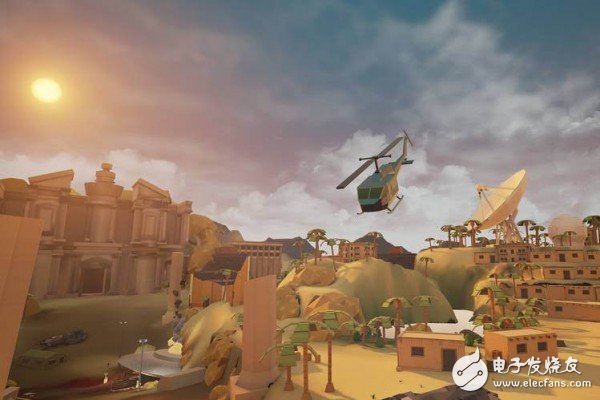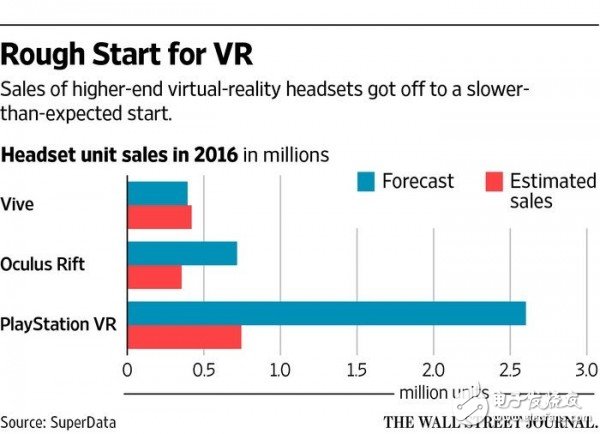On February 15th, the online edition of The Wall Street Journal stated that although the prospects of the VR market are bright and have gained widespread optimism from industry companies, in the short term, Sony PS VR, Oculus Rift and other high-end headsets are sold. The price is expensive and the popularity is slow. On the other hand, developers can't make money on the game and have begun to re-examine their VR strategy. Some VR startups underestimated the challenge and eventually closed down.
In order to solve this problem, companies such as Facebook are also increasing the promotion of VR, demonstrating the VR experience in more public places, and sponsoring developers to bundle games and devices for sale and increase the revenue of developers.
The following is the full text of the article:
When game developer RocketWerkz released one of the first virtual reality (VR) games last spring, New Zealand studio developers hoped the game would break even and might even be profitable.
Developers can't make money
However, these two hopes have failed. RocketWerkzCEO Dean Hall said the strategy game "Out of Ammo" is priced at $20, and the company's development cost for the game is about $650,000. Only about 60% was recovered. Now, RocketWerkz has re-developed traditional PC games.

VR game "Breaking the Food"
Supporters of VR technology have stated that VR will be the next major advancement in computing. However, despite the high sales of VR devices relying on smart phones, the more expensive VR headsets connected to high-performance PCs or gaming consoles have not met expectations.
This prompted some developers to start revisiting VR. "The future of VR is very bright, but in the short term, this is not an industry that suits us," Hall said. "For us, the return on investment is not enough."
Venture capital firm VoyagerCapital invested $100,000 in VR software developer Envelop VR in 2015, which enables users to interact with traditional desktop applications in a VR environment. Erik Benson, a partner at Voyager, said that EnvelopVR had closed down in January despite raising more than $5 million.
Benson said that startups want to survive the early days of the VR industry, but the actual challenges may be greater than they expected.
Envelop VR CEO declined to comment.
High-end equipment sales are lower than expected
Market research firm IDC expects sales of high-end headsets such as Sony's PS VR, Oculus Rift and HTC Vive to be 2.2 million units last year, with sales of about $1.4 billion, less than IDC had expected. IDC lowered its 2017 high-end VR equipment sales forecast to 6.4 million units with sales of $3.2 billion.
Actual sales of high-end VR devices are much lower than expected by other research companies. SuperDataResearch originally expected sales of high-end VR equipment to be 3.7 million units last year, but in the end it was only 1.4 million units. According to SuperData, Sony PS VR sold sales last year, about 745,000 units. Facebook sold about 243,000 Rifts, and HTC sold about 420,000 Vives.

High-end VR headsets sold less than expected
“VR manufacturers and developers have invested all their enthusiasm, but the consumer market has not given the same level of response,†said Shauna Heller, founder of consulting firm Clay Park VR. Heller was a developer relations expert at Facebook's Oculus VR.
Proponents of VR technology believe that VR will succeed. Japanese game developer Kapukong said that nearly 10% of the Resident Evil 7 players on the PS4 will also play the VR version.
Increase efforts to promote VR
One obstacle that affects the popularity of VR devices is that casual players can't experience the special charm of VR just by watching ads or watching other people wearing head-mounted devices. “This is an interactive experience with hardware products,†said Eric Lempel, head of marketing at Sony's PlayStaTIon division. “You have to wear a headset to experience it.â€
Headwear manufacturers also organize events to showcase VR experiences in more public venues, such as supermarkets, college campuses, and festivals. They are also working to make VR devices more user-friendly, such as developing higher-end headsets that don't require a PC.
At the same time, Facebook and HTC invested hundreds of millions of dollars in aiding developers. They bundled some games with headsets for sale. This has helped some developers to a good start, such as OwlchemyLabs, a Texas developer.
Owlchemy's VR game "JobSimulator" is temporarily bundled with HTC Vive for sale. Owlchemy CEO Alex Schwartz said that Work Simulator is now profitable, with revenues of more than $3 million, mostly from players who spend about $30 to download a copy of the game.
For other software companies, attracting a large number of users has always been a challenge. For example, RocketWerkz did not receive financial assistance and its games were not bundled with VR devices.
Seattle startup PerilousOrbit and its British partner CherryPop Games have achieved some success in the SportsBar VR game. This $20 game allows users to project darts and play other indoor games. PerilousCEO Richard Kidd said the game has been profitable, but sales have fallen sharply since it went live.
“The growth of the market is slower than we expected,†he said. “We can’t push the company’s growth as we want.â€
Headwear manufacturers also acknowledge that developers may take longer to get a return on VR games. “This is the tuition,†said Facebook’s Oculus content director Jason Rubin.
Electric Grill,Electric BBQ Grill,Portable Barbecue Grill,Electric Barbecue
Shaoxing Haoda Electrical Appliance Co.,Ltd , https://www.zjhaoda.com